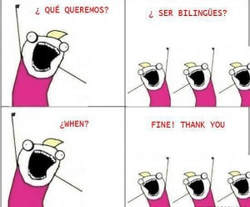“The United States of America has more monolingual experts on bilingual education than any other country in the world.”
— Roberto Bahruth, “Perspectives on Teaching English Language”

You can look at the influx of native Spanish (and other) language speaking children into our schools in two ways: that they are a potential source for a future multi-lingual United States, putting us on the cutting edge for international trade, politics and industry. Or, that they are this huge hindrance to our country’s future because, you know, the whole world speaks English.
As a translation company, how could we feel differently? We’re in a constant need for more qualified translators because the need for translation is increasing year-on-year to the point where it is one of the fastest growing industries in the United States (and around the world) today. More and more companies want and need to expand into new markets, and those markets speak other languages. Frankly, you can’t compete today if you’re monolingual. We said it. We welcome other points of view, but that’s ours.
The United States Has a Natural Resource That We Historically Squander
And that resource is bilingualism and bilingual education. Here’s a summary of the weird history of stamping out a valuable national resource in bilingual education:
- Mid ninteenth century — The United States managed to “save” many Native Americans by effectively wiping out languages (and cultures) such as Cherokee, Ojibwe, and Navajo.
- Around World War 1 — There was such an anti-German hysteria that we closed German language schools, effectively wiping out German speaking communities.
- Until Mid-Twentieth Century in Texas — It was routine to expel, shame and force monolingualism on Mexican-American students.
Bilingual Education Done Well
Why do we prize bilingual education for our native English speaking children, but seemingly despise it in our children from native Spanish or other language backgrounds?
You can answer that yourself.
Bottom line is that bilingual education policy would nurture a valuable natural resource that already exists in our country. We are a country of immigrants. We were founded as a melting pot, grew as a melting pot, and will succeed in the future as a melting pot.
LanguageTran Endorses Bilingual Education
LanguageTan has a vested interest in Americans embracing bilingual education. The translation industry is one of the fastest growing sectors of the economy, and we are excited about the opportunities ahead of us. We want to use our home grown resources (American translators) as much as we can when we are creating our teams of translators. But if this country refuses to embrace bilingual education, we have to look wherever we can to find qualified translators. We do understand that Europeans may find it more natural to embrace bilingualism, since there is often much more opportunity to live and immerse oneself in a new language an culture. The same cannot be said for most English-speaking Canadians or Americans. Still, when children have the chance to keep more than one language, we say that this should be encouraged and embraced.
Watch This One-Minute Video for a Funny Reason To Endorse Bilingualism:

 RSS Feed
RSS Feed